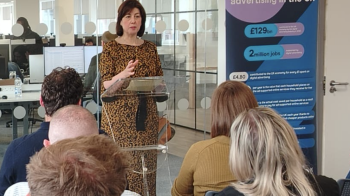What’s happening with the HFSS ad ban?
Posted on Tuesday 10 September 2024 | IAB UK
Is the Government still planning to implement the ban in October 2025? Read on for an update from our policy and regulatory affairs team
What has happened to date?
-
In 2022, Parliament passed the Health and Care Act, which included new restrictions that prohibit paid-for online ads for “less healthy” food and drink products. The new restrictions were introduced as part of a wider Government push to tackle perceived drivers of childhood obesity
-
Less healthy products are a subset of products classified as high fat, salt or sugar (HFSS), which have all been subject to dedicated restrictions in the UK Advertising Codes since 2007. These pre-existing restrictions are designed to limit children’s exposure to HFSS product ads
-
The less healthy product rules constitute a new prohibition on this subset of HFSS products. The new less healthy product rules will apply in addition to CAP and BCAP’s existing HFSS rules.
-
The Government’s original intention was to bring these new ‘less healthy’ advertising restrictions into force in early 2023. However, the implementation date was delayed several times because the relevant secondary legislation – which provides crucial clarity on how the ban will work in practice - had not been passed into law. In the absence of this secondary legislation, businesses were unable to prepare effectively for implementation
-
As it stands, the ban is due to come into force on 1 October 2025
What’s happening with the secondary legislation?
-
The previous Government ran a consultation on a draft of the secondary legislation in December 2023. Since then, IAB UK has been lobbying extensively to put pressure on the Government to respond to the consultation and introduce the secondary legislation to Parliament.
-
In the King’s Speech in July 2024, the new Labour Government confirmed that it was committed to implementing the ban as planned on 1st October 2025. IAB UK worked with other key trade bodies to engage with new Ministers as soon as they were appointed to impress upon them the importance of prioritising the completion of the legislative process.
-
On 12 October, Department of Health Minister Andrew Gwynne MP made a written ministerial statement which confirmed that the government would ‘move forward to laying the final legislation and publishing guidance’.
-
In parallel, the Government published its formal response to the 2022 consultation on draft secondary legislation. Based on the Government’s response we don’t expect to see any significant changes to the draft legislation before it is introduced to Parliament. However, the government's response does helpfully re-confirm that:
- Brand advertising is out of scope of the restrictions
- Food and drink SME’s are exempt from restrictions, though note that the exemption only applies where the person who pays for the advertisement to be placed on the internet is an SME
- The ban does not apply to ‘owned media’
-
The Government also committed to:
- Clarifying the wording to better define what is meant by a ‘visual advertisement included with an audio item’. This addresses a concern that IAB UK raised in our consultation response that the definition in the draft was not sufficiently clear.
- Providing ‘further guidance’ (including examples) to clarify some points relating to scope that stakeholders felt were unclear. This will include additional guidance on product categories and examples of what food and drink products fall within scope of specific categories.
-
Alongside the response, the Government launched a further short consultation on proposals for determining whether the TV or online regime applies to internet protocol television (IPTV) services which deliver television live over the internet. It proposes that the applicable regime should be determined by whether or not the service is subject to Ofcom broadcast regulation. This further consultation closes on 10th October.
-
Based on what we know so far, we can expect the secondary legislation to be introduced to Parliament towards the end of the year. We will update members as soon as there is more information available.
New steps – guidance for advertisers
-
While Ofcom is the statutory body responsible for implementing/enforcing the ban, it has designated the Advertising Standards Authority (ASA) as the frontline regulator. The ASA will therefore have day-to-day responsibility for ensuring advertisers comply with the terms of the ban. CAP, as the rule-writing body for the ASA system, is incorporating the legal requirements into the advertising Code
-
In December 2023, CAP launched a consultation (now closed) on draft guidance for advertisers. This guidance is designed to support advertisers with understanding and complying with the terms of the ban
-
The draft guidance covers:
- The scope of the restrictions
- What is likely to be considered an identifiable less healthy food and drink product under the ‘less healthy’ rules
- The application of the ‘less healthy’ rules to branding
- Having considered feedback from stakeholders, including IAB UK, CAP is now finalising the guidance but cannot publish it until the secondary legislation is passed and the legislative process is complete. Once that happens and Ofcom has approved the final version, CAP will be in a position to publish the guidance. Exact publication timelines remain tbc given the dependency on the secondary legislation
IAB UK will arrange a dedicated call for members to discuss the guidance when it has been published.
Related content
IAB UK champions SMEs using digital advertising in Parliament
Learn moreGovernment sets out long-term vision for the creative industries
Learn moreAll roads lead to Manchester
Learn morePowering Up 2025: recommendations to help SMEs unlock the power of digital
Learn more
Fast forward to 2030 with Futurescape
An in-depth exploration of the attitudes, innovations and media shifts that will shape the years ahead and redefine how we advertise by the turn of the decade


